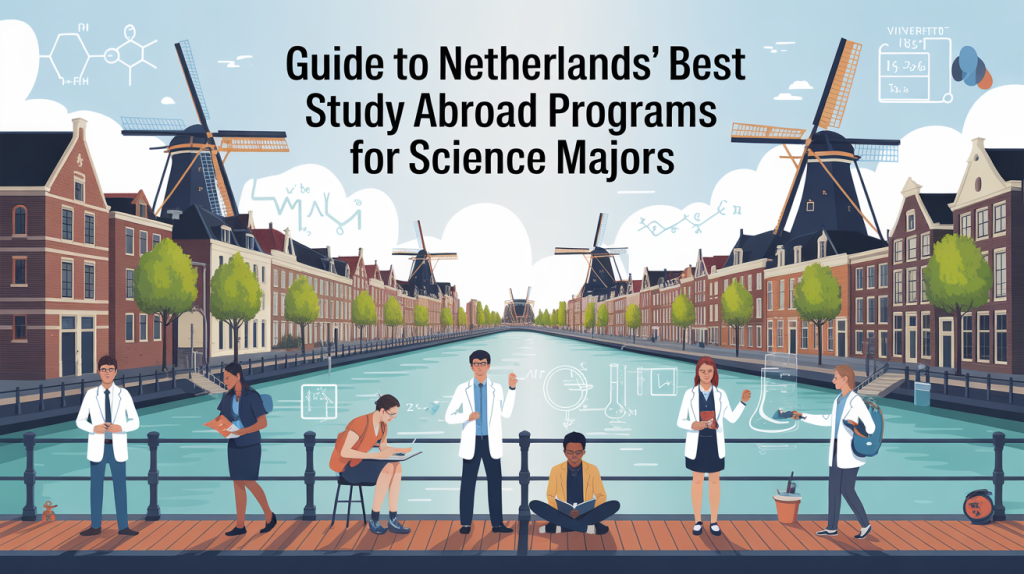A Guide to Netherlands’s Best Study Abroad Programs for Science Majors
Bachelor of Science Programs |
Master of Science Programs |
Key Features |
Admission Requirements |
Leveraging Resources |
Why Partner |
Conclusion |
Take the Next Step
Overview of Science Education in the Netherlands
The Dutch higher education system is known for its high academic standards, English-taught programs, and research-oriented curricula. These strengths make the Netherlands an ideal choice for international students looking to pursue science degrees.
Bachelor of Science (BSc) Programs in the Netherlands
The Netherlands boasts a wide range of competitive undergraduate science programs. These degrees typically last three years full-time and emphasize both theoretical foundations and practical applications.
Featured Bachelor’s Programs
Maastricht Science Programme (Maastricht University)
Type: Interdisciplinary BSc in Natural Sciences
Duration: 3 years, full-time
Highlights:
- Offers flexibility to design a personalized study path crossing different scientific domains.
- Encourages both broad learning and specialization.
- Strong focus on research methods and hands-on projects.
- Taught entirely in English at the Faculty of Science and Engineering.
Green Chemistry (NHL Stenden University of Applied Sciences)
Type: BSc in Sustainable Chemistry
Duration: 3 years, full-time
Location: Emmen, Northern Netherlands
Highlights:
- Focused on sustainable chemical solutions and environmental challenges.
- Emphasizes resource efficiency, eco-friendly material development, and circular economy principles.
- Perfect for students passionate about sustainability and green innovation.
Master of Science (MSc) Programs in the Netherlands
Graduate science education in the Netherlands offers advanced research opportunities for students holding relevant undergraduate degrees. Dutch MSc programs typically last two years and deepen both theoretical knowledge and scientific investigation skills.
Noteworthy MSc Program
Spatial Sciences (Research) (University of Groningen)
Type: Research Master’s in Spatial Sciences
Duration: 2 years
Focus:
- Develops advanced research skills with an emphasis on spatial analysis.
- Suitable for students curious about human-environment interactions, geography, and spatial data science.
- Supports scientific freedom and individual research interests.
Key Features of Dutch Science Education Programs
Understanding what sets Dutch science programs apart aids international recruiters and educational professionals in advising prospective students accurately. The Netherlands’ science curricula collectively exhibit the following key characteristics:
- English-Taught Programs: Facilitates accessibility for international students by removing language barriers.
- Research-Oriented Curriculum: Encourages the development of critical thinking and scientific inquiry from an early stage.
- Practical Application: Project-based learning and internships ensure students connect theory with real-world challenges.
- Interdisciplinary Options: Many programs offer flexibility across traditional science boundaries, supporting versatile career paths.
- International Environment: Diverse cohorts and global faculty enrich cultural exchanges and networking opportunities.
Admission Requirements for Science Programs
Admission criteria differ slightly depending on the university and program level, but typically include the following for science majors:
For Bachelor’s Programs
- Completion of secondary education equivalent to the Dutch VWO diploma.
- Proficiency in English demonstrated through standardized tests such as IELTS or TOEFL.
- Submission of academic transcripts and possibly a motivation letter.
For Master’s Programs
- A relevant Bachelor of Science degree or its equivalent.
- Proof of English language proficiency, generally IELTS or TOEFL scores.
- Letters of recommendation and statement of purpose.
- Academic transcripts and sometimes a portfolio or research proposal.
Leveraging Study in Netherlands Resources for Student Recruitment
Recruiters, admissions officers, HR, and marketing teams working in education and student placement will find the Study in Netherlands platform invaluable. The platform offers:
- Studyfinder Tool: An up-to-date, independent searchable database of all English-taught science programs.
- Detailed Information: Program descriptions, admission criteria, application deadlines, and university profiles.
- Recruitment Support: Resources that simplify faculty outreach and student communication.
Why Partner with Study in Netherlands?
As the leading platform in international education recruitment focused on the Netherlands, Study in Netherlands stands out due to its:
- Authoritative Content: Reliable, current data verified directly with Dutch universities.
- SEO-Optimized Presence: Ensures maximum online visibility for educational institutions and agencies.
- Comprehensive Support: From student inquiry handling to application tracking and onboarding.
Conclusion
For science majors seeking world-class study abroad opportunities, the Netherlands offers a diverse array of English-taught programs designed to combine academic rigor with practical experience. From innovative bachelor’s degrees like Maastricht Science Programme and Green Chemistry to specialized research master’s such as Spatial Sciences at the University of Groningen, Dutch universities provide unique pathways tailored to international students’ ambitions.
Recruiters and education professionals should leverage the comprehensive resources available through the Study in Netherlands platform to identify ideal programs and streamline student placements.
Take the Next Step with Study in Netherlands
Ready to help your students unlock the full potential of a Dutch science education? Contact Study in Netherlands today to discover partnership opportunities, gain access to exclusive recruitment tools, and stay informed on the latest science programs available for international students.

